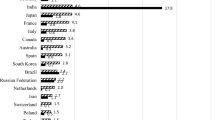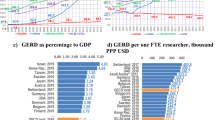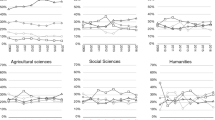Abstract
Recently, the Russian government has ordered evaluation and reform of the basic research system. As a consequence, the number of research staff at the Russian Academy of Sciences will be reduced by 20% by 2007. The basis for research evaluation and institute budgeting will be bibliometric indicators. In view of these changes we look at the Russian publication output and argue that
-
(1)
publication output and citedness have to be considered in relation to the level of expenditure on R&D
-
(2)
bibliometric indicators depend strongly on the database used (ISI’s databases are biased) and their interpretation can be confusing; better coverage of Russian publications or a Russian Science Citation Index are needed. Also, research results are communicated in more ways than paper publications.
-
(3)
policy makers have misused ISI statistics to demonstrate “a low level” of Russian R&D.
Our paper is a part of a project designed to trace R&D development in a transition economy and knowledge transfer from basic research to innovation. Results of our project shed light on science policy and the social issues due to the indiscriminate introduction of quantitative indicators.
Similar content being viewed by others
References
Russian Federation Policy in R&D Development Till 2010 and in the Future (2002), Approved by President of RF and the Council of Ministry of RF, Decree N-576.
Garfield, E., Welljams-Doroff, A. (1990), The language use in international research: A citation analysis. Essays of an Information Scientist,. 13: 282–295.
Libkind, I., Libkind, A., Markusova, V., Minin, V., Jansz, M. (2006), Index of RFBR as Scientific Information Search and Analysis Tool. The 9th International Conference on Science and Technology Indicators. Leuven, Belgium, 2006, September 7–9., 229–233.
Makarov, V. L., Varshavsky, A. E. (2004), Innovation management in Russia. Moscow, Nauka, 879.
Ren, S., Rousseau, R. (2004), The role of China’s English-language scientific journals in scientific communication. Learned Publishing, 17(2): 99–104.
Sivertsen, G. (2006), A bibliometric model for performance based budgeting of research institutions.
Wilson, C., Markusova, V. (2004), Changes in the scientific output of Russia from 1980 to 2000, as reflected in the Science Citation Index, in relation to national politico-economic changes. Scientometrics, 59(3): 345–389.
Author information
Authors and Affiliations
Corresponding author
Rights and permissions
About this article
Cite this article
Markusova, V.A., Jansz, M., Libkind, A.N. et al. Trends in Russian research output in post-Soviet era. Scientometrics 79, 249–260 (2009). https://doi.org/10.1007/s11192-009-0416-0
Received:
Published:
Issue Date:
DOI: https://doi.org/10.1007/s11192-009-0416-0




